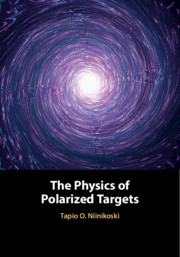Book contents
- The Physics of Polarized Targets
- The Physics of Polarized Targets
- Copyright page
- Dedication
- Contents
- Preface
- Acknowledgements
- 1 Introduction to Spin, Magnetic Resonance and Polarization
- 2 Resonance and Relaxation of Interacting Spin Systems
- 3 Electron Paramagnetic Resonance and Relaxation
- 4 Dynamic Nuclear Polarization
- 5 Nuclear Magnetic Resonance and Relaxation
- 6 NMR Polarization Measurement
- 7 Polarized Target Materials
- 8 Refrigeration
- 9 Microwave and Magnet Techniques
- 10 Other Methods of Nuclear Spin Polarization
- 11 Design and Optimization of Polarized Target Experiments
- Appendices
- Index
- References
9 - Microwave and Magnet Techniques
Published online by Cambridge University Press: 03 February 2020
- The Physics of Polarized Targets
- The Physics of Polarized Targets
- Copyright page
- Dedication
- Contents
- Preface
- Acknowledgements
- 1 Introduction to Spin, Magnetic Resonance and Polarization
- 2 Resonance and Relaxation of Interacting Spin Systems
- 3 Electron Paramagnetic Resonance and Relaxation
- 4 Dynamic Nuclear Polarization
- 5 Nuclear Magnetic Resonance and Relaxation
- 6 NMR Polarization Measurement
- 7 Polarized Target Materials
- 8 Refrigeration
- 9 Microwave and Magnet Techniques
- 10 Other Methods of Nuclear Spin Polarization
- 11 Design and Optimization of Polarized Target Experiments
- Appendices
- Index
- References
Summary
Microwave sources and waveguide components are commercially available and therefore we shall limit ourselves to describing their physical principles and main limitations in the polarized target applications. The propagation modes and the complex propagation constants in rectangular and round guideas are derived and described. Simple waveguide components and circuits are discussed in view of control and optimization of the power, frequency and modulation for DNP. The main design principles and criteria are presented for iron core magnets and their cobalt–iron pole pieces. For superconducting solenoid and dipole magnets, the focus is in the winding accuracy. The control and protection of large superconducting magnets is also briefly discussed.
Keywords
- Type
- Chapter
- Information
- The Physics of Polarized Targets , pp. 393 - 420Publisher: Cambridge University PressPrint publication year: 2020

